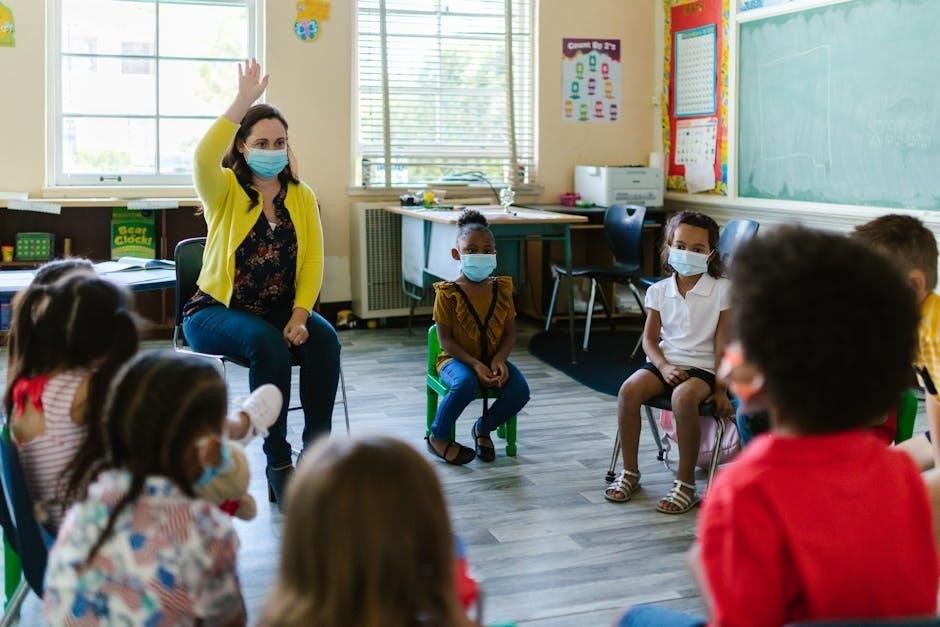An instructional facilitator supports educators in enhancing teaching strategies, fostering a positive classroom environment, and using data-driven approaches to improve student learning outcomes effectively․
1․1 Definition and Overview
An instructional facilitator is an educational professional who works collaboratively with teachers to enhance instructional practices, student engagement, and learning outcomes․ Their role involves providing guidance, resources, and support to educators, helping them implement effective teaching strategies and assess student progress․ By fostering a supportive classroom climate and promoting evidence-based practices, instructional facilitators play a pivotal role in improving the quality of education and ensuring that all learners achieve their full potential․
1․2 Importance in Educational Settings
Instructional facilitators are crucial in educational settings as they enhance teaching strategies, support teacher professional growth, and improve student outcomes․ By fostering a positive classroom climate and using diagnostic assessments, they help identify learning needs and implement targeted interventions․ Their role in promoting evidence-based practices ensures that educators can address diverse student requirements effectively, ultimately contributing to higher academic achievement and institutional goals․

Key Responsibilities of an Instructional Facilitator
Instructional facilitators support educators in improving teaching effectiveness, enhancing student outcomes, and fostering collaboration․ They guide data-driven decisions, promote professional development, and ensure alignment with educational goals․
2․1 Supporting Teachers in Instructional Strategies
Instructional facilitators assist teachers in developing and refining teaching methods, providing resources and training to enhance classroom practices․ They help educators implement evidence-based strategies, differentiate instruction, and integrate technology to meet diverse student needs․ By modeling effective techniques and offering feedback, facilitators empower teachers to create engaging and inclusive learning environments․ This support ensures that instructional approaches are aligned with educational goals, fostering improved student outcomes and teacher confidence․
2․2 Conducting Diagnostic Assessments
Instructional facilitators use diagnostic assessments to identify students’ strengths, weaknesses, and learning gaps․ These assessments help pinpoint areas where students may need additional support or enrichment․ By analyzing data from these evaluations, facilitators collaborate with teachers to design targeted instructional strategies․ This process ensures that teaching methods are tailored to meet the diverse needs of learners, ultimately enhancing academic performance and supporting overall educational goals․ Diagnostic assessments are a crucial tool for data-driven decision-making in the classroom․
2․3 Fostering a Supportive Classroom Climate
Instructional facilitators play a key role in creating an inclusive and respectful classroom environment․ They work with teachers to promote collaboration, empathy, and active participation among students․ By fostering a positive climate, facilitators help students feel safe and engaged, which is essential for effective learning․ Strategies include encouraging open communication, addressing diverse needs, and implementing practices that build a sense of community․ A supportive climate not only enhances student well-being but also improves academic engagement and overall success․
Skills and Qualifications Required
An instructional facilitator must possess strong instructional expertise, data-driven decision-making abilities, and excellent interpersonal and communication skills to support teachers and students effectively in educational settings․
3․1 Instructional Expertise
An instructional facilitator must demonstrate deep content knowledge and understanding of effective teaching methods․ They should be well-versed in curriculum design, instructional strategies, and evidence-based practices to support teacher development․ Their expertise enables them to guide educators in aligning lessons with learning objectives and standards․ Additionally, they must stay updated on educational research and trends, ensuring they can provide relevant, research-backed guidance to enhance teaching practices and student outcomes across diverse learning environments․
3․2 Data-Driven Decision Making
Instructional facilitators must be adept at collecting and analyzing data to inform teaching practices․ They use diagnostic assessments and student performance data to identify learning gaps and strengths․ By interpreting this information, they help teachers adjust instructional strategies and monitor progress effectively․ Data-driven decision making ensures that interventions are targeted and impactful, leading to improved student outcomes and more efficient use of educational resources․ This skill is crucial for aligning instruction with learner needs and achieving measurable academic success․
3․2 Interpersonal and Communication Skills
Strong interpersonal and communication skills are essential for instructional facilitators to build trust and collaboration with teachers and students․ They must effectively listen, clarify needs, and provide constructive feedback․ Clear communication helps in conveying strategies and fostering a supportive environment․ Emotional intelligence and conflict resolution abilities also enable facilitators to navigate diverse perspectives and maintain positive relationships, ensuring effective teamwork and problem-solving in educational settings․ These skills are vital for fostering a collaborative and inclusive learning atmosphere․
The Process of Instructional Facilitation
Instructional facilitation involves identifying learner needs, planning strategies, implementing interventions, monitoring progress, and adjusting approaches to ensure effective teaching and learning outcomes consistently․
4․1 Identifying Learners’ Needs
Identifying learners’ needs is a critical step in instructional facilitation, involving diagnostic assessments, teacher observations, and data analysis to understand student strengths and gaps․ Instructional facilitators use these tools to pinpoint specific learning challenges and opportunities, ensuring tailored support․ This process also involves understanding individual learning styles, prior knowledge, and educational backgrounds to create personalized strategies․ Accurate identification of needs ensures that interventions are relevant and effective, laying the foundation for successful learning outcomes and teacher support․
4․2 Planning and Implementing Strategies
Instructional facilitators collaborate with teachers to design and execute targeted strategies based on identified learner needs․ This involves selecting evidence-based practices, aligning interventions with curriculum goals, and differentiating instruction to meet diverse student requirements․ Facilitators ensure strategies are actionable, measurable, and adaptable, fostering a collaborative environment for continuous improvement․ Regular feedback and adjustments are made to optimize teaching methods and enhance student outcomes, ensuring that instructional plans remain relevant and effective in addressing learner needs․
4․3 Monitoring Progress and Adjusting Approaches
Instructional facilitators continuously monitor the effectiveness of implemented strategies through assessments and observations․ They collect data to track learner progress, identify gaps, and provide actionable feedback to teachers․ Based on this information, facilitators collaborate with educators to refine approaches, ensuring alignment with student needs and curriculum goals․ This iterative process involves making timely adjustments to optimize teaching methods and enhance learning outcomes, fostering a dynamic and responsive instructional environment that prioritizes continuous improvement and student success․

Tools and Resources for Effective Facilitation
Instructional facilitators utilize educational technologies, diagnostic assessments, and evidence-based practices to support teaching and learning․ Collaboration platforms and data analysis tools enhance their ability to monitor progress and adapt strategies effectively․
5․1 Educational Technologies
Educational technologies play a crucial role in facilitating instruction by providing tools like learning management systems, interactive whiteboards, and educational videos․ These technologies enable facilitators to deliver content more effectively, engage students, and support personalized learning․ Collaboration platforms and multimedia resources enhance teacher-student interaction, while data analytics tools help track progress and refine instructional strategies․ By leveraging these technologies, facilitators can create dynamic, inclusive, and adaptive learning environments that cater to diverse student needs and promote academic success․
5․2 Assessment and Diagnostic Tools
Assessment and diagnostic tools are essential for identifying learners’ strengths and weaknesses, enabling targeted support․ These tools include quizzes, surveys, and progress monitoring software, which provide insights into student understanding․ By analyzing data from these assessments, instructional facilitators can refine teaching strategies, address learning gaps, and track progress over time․ Diagnostic assessments also help in personalizing instruction, ensuring that interventions are tailored to meet individual student needs and promoting overall academic improvement․
5․3 Evidence-Based Practices
Evidence-based practices are teaching strategies supported by scientific research, ensuring effectiveness in educational settings․ Instructional facilitators implement these practices to enhance teaching methods and student outcomes․ By utilizing data and research, facilitators promote informed decision-making and continuous improvement․ These practices, validated through rigorous studies, contribute to a culture of professional development and excellence in education, ultimately benefiting both educators and students․

The Impact of Instructional Facilitators
Instructional facilitators significantly enhance educational outcomes by improving teacher effectiveness, fostering student engagement, and promoting continuous professional development, ultimately creating a more supportive and effective learning environment․
6․1 Improving Student Engagement
Instructional facilitators play a crucial role in enhancing student engagement by fostering a supportive classroom climate and implementing evidence-based strategies․ By understanding learners’ needs and incorporating interactive methods, facilitators help students stay motivated and focused․ Engaging activities, such as hands-on tasks and technology integration, encourage active participation and deeper understanding of content․ This leads to increased student interest, improved attendance, and higher academic performance․
Facilitators also promote intentional questioning and scaffolding techniques, enabling students to think critically and connect new information to prior knowledge․ By addressing individual learning gaps and fostering a sense of belonging, instructional facilitators create an environment where students feel valued and empowered to succeed․

6․2 Enhancing Teacher Effectiveness
Instructional facilitators enhance teacher effectiveness by providing professional development opportunities, instructional resources, and collaborative planning support․ They help educators refine their teaching strategies and integrate innovative techniques into the classroom․ By fostering a culture of continuous improvement, facilitators empower teachers to reflect on their practices and adapt to student needs․ This support enables educators to deliver high-quality instruction, fostering both teacher confidence and student success․
Facilitators also assist teachers in analyzing student data to inform instruction, ensuring targeted interventions and differentiated learning experiences․ Through ongoing feedback and coaching, instructional facilitators play a key role in helping teachers grow professionally and stay updated on best practices in education․
6․3 Promoting Continuous Professional Development
Instructional facilitators promote continuous professional development by providing teachers with targeted training, resources, and opportunities for growth․ They encourage educators to engage in collaborative learning, peer observation, and reflective practices to enhance their instructional skills․ By fostering a culture of continuous improvement, facilitators ensure that teachers stay updated on best practices and evidence-based strategies, ultimately benefiting student learning outcomes;
Facilitators also support teachers in setting professional goals and accessing relevant professional development opportunities․ This ongoing support helps educators refine their teaching methods and adapt to evolving educational needs, ensuring they remain effective and impactful in the classroom․